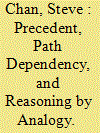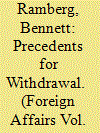| Srl | Item |
| 1 |
ID:
124104


|
|
|
|
|
| Publication |
2012.
|
| Summary/Abstract |
The article offers comments on the need for a strategy and policy to respond to cyber attack as it is allegedly impossible to block every cyber attack. It is suggested that the industries learn from the vulnerability of the networks attacked while understanding that there is no single defense against a sophisticated and constantly morphing offense. Comments on cyberspace having no boundaries and changing constantly and the need to formulate active defense are also included.
|
|
|
|
|
|
|
|
|
|
|
|
|
|
|
|
| 2 |
ID:
187984


|
|
|
|
|
| Summary/Abstract |
This essay addresses the strategic implications of the Russo–Ukrainian War as it pertains to relations between China and the US, especially with respect to how this conflict may inform prospective developments across the Taiwan Strait. I pursue this question under three topics: the influence of precedents, path dependency, and reasoning by analogy. The war in Ukraine has interrupted Washington’s intention to pivot to Asia to focus on containment of a rising China, and it has also caused Moscow and Beijing to align more closely. Finally, it may have made the direct military intervention of the US in a possible future crisis involving Taiwan less likely.
|
|
|
|
|
|
|
|
|
|
|
|
|
|
|
|
| 3 |
ID:
086020


|
|
|
|
|
| Publication |
2009.
|
| Summary/Abstract |
In November 2008, the governments of the United States and Iraq agreed that U.S. troops would leave Iraq by 2011 -- eight years after the U.S. invasion. For some, this is much too soon. These critics argue that events on the ground, not an artificial deadline, should govern the pullout and that, in any case, a residual force should remain for decades.But as Washington ponders how long to stay in Iraq, it would do well to examine the strategic impact of the United States' withdrawal from other conflict-riven countries: Vietnam and Cambodia in the 1970s, Lebanon in the 1980s, and Somalia in the 1990s. Even though Washington's commitment to these situations differed in its degree, disengagement eventually proved to be the right policy for the United States. Abandonment damaged Washington's credibility at first, but it was the best way to protect U.S. interests in the long run. The dominoes did not fall after the United States left Southeast Asia; Moscow did not fill the power vacuum in Lebanon; Washington has been largely unaffected by the failed state of Somalia. In each case, after the United States exited, its adversaries became preoccupied with consolidating power and embroiled themselves in conflicts with neighboring countries. A regional stability of sorts emerged, leaving Washington's vital interests intact. For
|
|
|
|
|
|
|
|
|
|
|
|
|
|
|
|